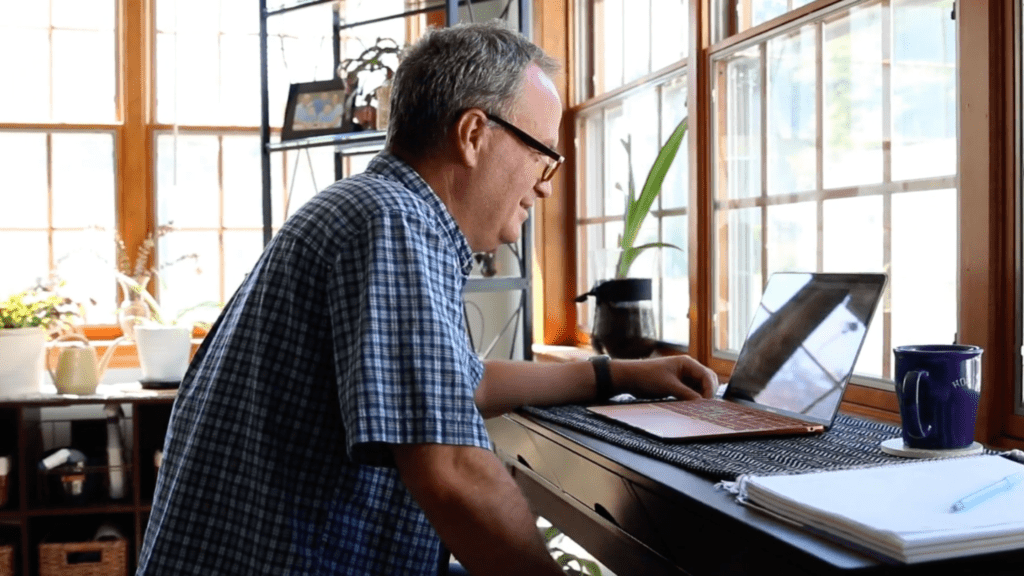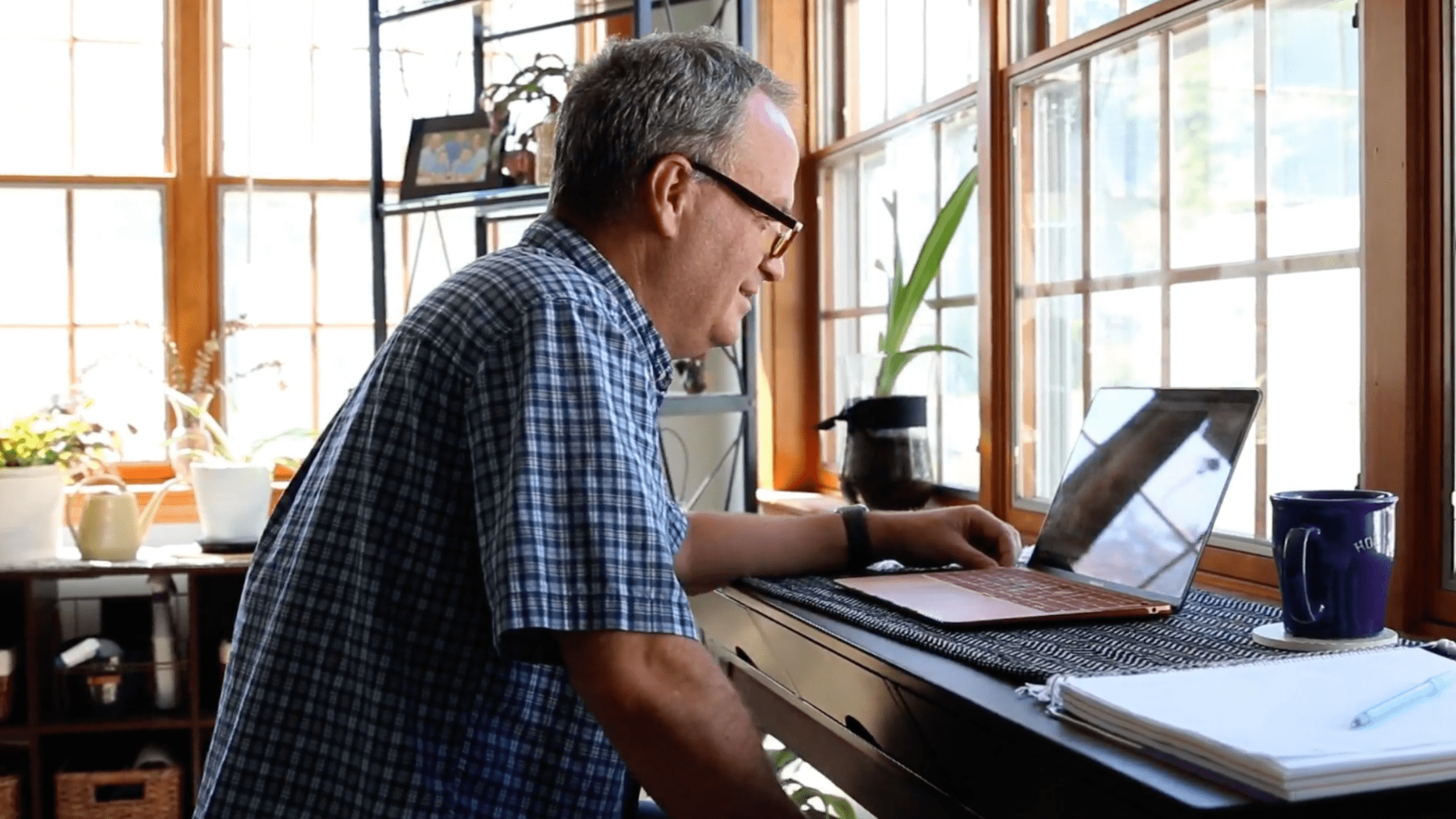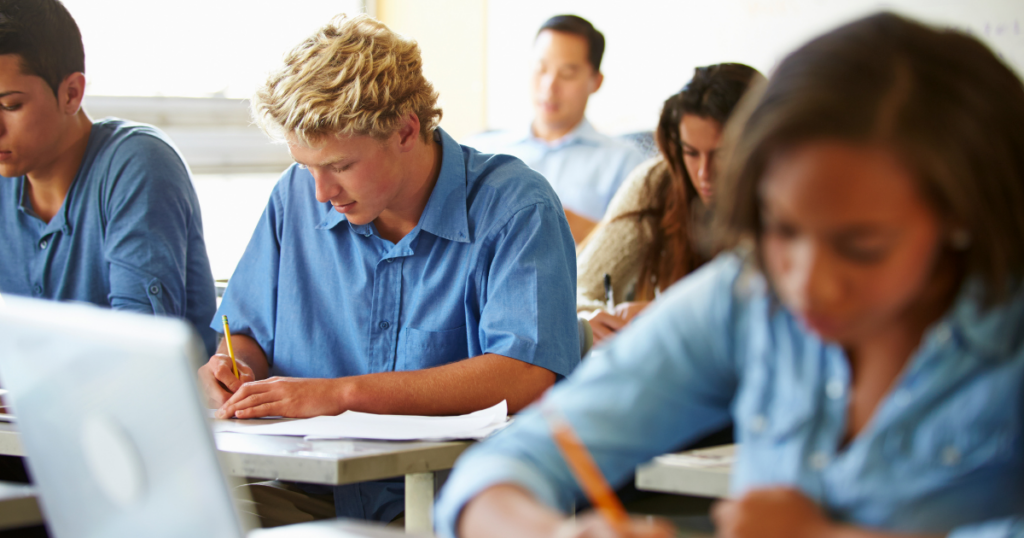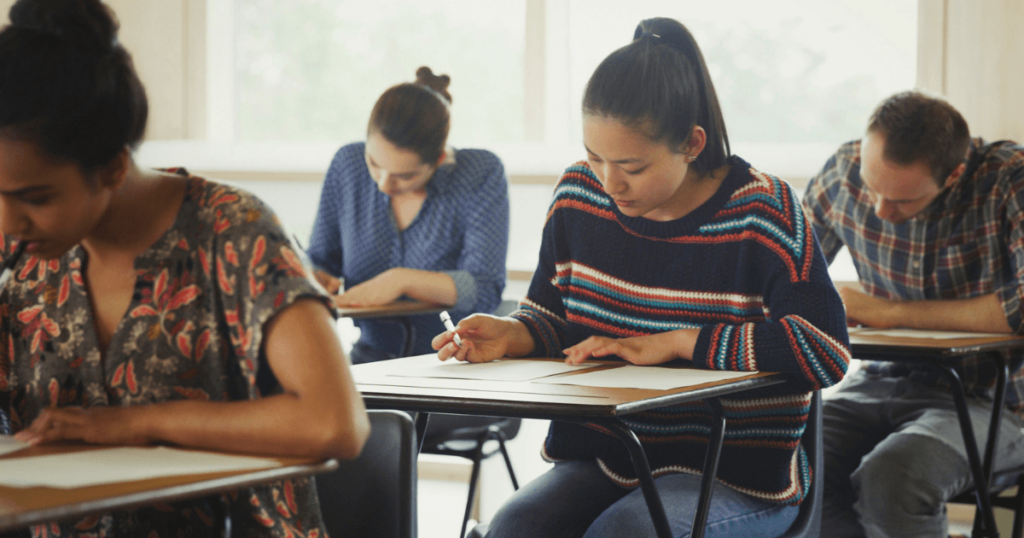When Kaly Washington joined VLACS as a World Languages teacher, she had already experienced VLACS from a parent perspective while homeschooling her three children, all of whom took VLACS’s self-paced learning courses while they were growing up. What hooked Kaly on VLACS was the student support.
Kaly emphasized, “Everyone [at VLACS] loves what they do. I work in an environment where I see people that really truly love what they do and are very dedicated to the students. They go above and beyond, and I saw that in the journey from my son to my daughter and now with my youngest son. Very caring individuals. Very devoted teachers.”
Similar to Kaly, before eventually becoming a teacher, Pete Galamaga enrolled his sons in VLACS courses. Pete first found out about VLACS through a job he had as a Blended Learning Lab Facilitator at his school district’s alternative program. One part of Pete’s job was to serve as a mentor for students enrolled in VLACS courses.
Pete explained, “I was doing that for a couple of years. And then I was so impressed with VLACS, I said, ‘This is really awesome.’ And so, I got my own sons taking some VLACS courses, so I got to understand what it was like to be a parent of a VLACS student.” Over time, Pete became familiar with the VLACS platform, the faculty, and staff, and “one day one of the instructors, she said to me, ‘You know, Pete, you should be doing this. You would be really great at it. And I really think you should do it. So, if there’s an opening, please jump in and apply.’ And I did. And here I am.”
Pete now serves as an adjunct English instructor, teaching first- and second-year student English courses. When asked about what he loves the most about VLACS, Pete shared, “One word: relationships.”
He continued, “I was a brick-and-mortar classroom teacher before coming to VLACS. Calling students wasn’t a big part of my repertoire. I enjoyed my classroom work. But it’s almost impossible to get a real connection with each student in a classroom of 25 students. And plus, they’re all very different, and they all have different needs and different communication styles. But you have to learn that over time in a brick and mortar. Whereas online, it’s like this. You’re sitting there. You’re talking, and you just make a point to not only do the academics, but you ask, ‘How are you doing?’ I have students where they’ll bring their pets up to the screen. Or they’ll tell me about something they did. I have a student who does dog sled racing, and we’ll talk about the latest race. I have a student who’s a passionate fisherman. So, you have that time. It’s definitely my favorite part of the job.”
VLACS supports are in place to help students be successful and prevent them from slipping through the cracks. These supports include but are not limited to welcome meetings for every class (even for experienced VLACS students), monthly calls with student and guardian/parent, discussion-based assessments, progress reports, and more.
Pete Galamaga shared, “If someone were to ask me about VLACS for their son or daughter, I think the things I would emphasize are the flexibility, the emphasis on relationships, and the experience in the virtual world of education. All three of those things are aspects of VLACS that make it a fantastic experience for any kid and their families.” When Pete meets with students and their families for their welcome calls, he says, “I’m on your team. I’m invested in you doing well. It matters to me that you get this credit, that you do well, and an extra bonus would be that you enjoy the experience.”
Jackie Gilbert, a full-time faculty member at VLACS, working part-time as a science teacher and part-time as a program manager, mentioned, “I think my favorite part about teaching at VLACS is the relationships that we’re able to build with our students. Almost 100% of our student contact is one-on-one. I love that I can take the time to get to know every single student, what they’re like, what they like to do, their hobbies.”
Like Pete and Jackie, Lauren Byrnes, who serves as a full-time social studies teacher at VLACS, shared, “Relationship is everything. It’s sort of like my window into how a student is progressing because we don’t see them every day. Each week, VLACS teachers are triaging. We’re looking at the grade book. We’re looking at the student information system to see how often they’re working and how many assignments they’re submitting each week. Without that relationship piece, I may not realize if a student has started to slip with their pace.”
While student success in course work is critically important, it’s not the only support VLACS offers its students. As Pete emphasized, “VLACS is really progressive — it’s a 21st-century mentality. It’s like, ‘What is the world these kids are going to be living in, and how can we make connections through this school to make their education really connect directly and be relevant to their future?'”
VLACS offers many paths for students to career opportunities. Lauren explained, “The Career Connections live sessions are incredible. We are giving students the opportunity to learn about careers and then possibly, if they are local, to get an internship or a job shadow. They’re learning about careers they may never have known existed, and it’s amazing that that can help guide their learning in high school as well or motivate their learning in high school to do well and maybe pursue a career that they got to see.”
Another way that students can learn about career opportunities and earn competencies is through VLACS experiences.
Lauren shared, “I have a student now in a global studies experience, and she has an outside expert helping her understand the competencies. They’re designing a deliverable that has real-world applications. If a student chooses to complete competencies as a Project, the final project can be a work product; for example, in the government class, they are a scriptwriter for a company, and they are doing a public service announcement for why citizenship participation in voting is so important. It’s really great to have a school like VLACS knowing that if a student emails their advisor or one of us or a school counselor and says, ‘You know, I’d really like to be an EMT,’ or, ‘I’d really like to learn more about computer programming,’ that they have that support. Whoever they reach out to here at VLACS, whether it’s a teacher or an advisor, we’ll put them in touch with an industry professional who will help them and will take them in and work with that student.”
Candace Hanser, who is the proud mother of son Erik, a full-time 11th grader at VLACS, raved about the guidance her son received. She shared, “His advisor just seems to be on top of it, and if he’s got a question and she doesn’t know the answer, she researches, and she gets back to him. I remember his first meeting as a freshman, and she just sat down with him, and she’s like, ‘Okay, what are your ultimate goals? What do you want to do?’ And when he said, ‘Well, ultimately, I want to play Division 1 baseball. That’s my ultimate goal.’ She did her own research on NCAA rules and made sure he has everything he needs so he would be able to get into a Division 1 school if he could.”
As Jade Anderson, an adjunct English instructor at VLACS, shared, “VLACS puts a big emphasis on building relationships and communication with your instructors, which I believe has a big impact in any college or career setting.”
For support, VLACS Alum Kai Dennet added, “Teachers have open hours, and they have meetings. So, you might be struggling with a subject, and you can very easily reach out to your teacher and just stop in. A lot of teachers allow for revision if you don’t do well on an assignment because they focus less on the grade and more on the end product. And so, they want to make sure that you know what you did wrong and you’re able to fix it for next time. You have a follow-up meeting with your teacher, and you can really delve into what you need to improve on.” VLACS continues to provide multiple layers of support for its students and families.
Kelly Rochford-Richardson, the mother of VLACS student Pi shared, “We met with every one of Pi’s teachers for a half-hour every month. It’s pretty amazing the relationship you build with a teacher when you have a half-an-hour one-on-one every month. They get to know you as a learner, but they also get to know you as a human being. And you get to know them as an instructor and human beings. We just have amazing heart connections with truly top-notch teachers. It’s all been a gift.” Pi added, “I actually came out to one of my favorite teachers before I came out to anyone outside of my parents and my boyfriend. So, I felt so close to that teacher that I was able to tell them what was going on in my life. And that meant the world to me.
Computer Science instructor Lindsey DeLorenzo added what she is most grateful for: “I’d have to say the people; I just love the community, the families, the culture, the authenticity. I love how authentic VLACS is. It’s the real deal.”
The bottom line – relationships are paramount to a successful learning experience. By leveraging the power of the digital classroom, teachers are able to foster genuine one-on-one interactions that support students’ personal growth and learning. Ready to start building meaningful relationships at our virtual school? Sign up for our self-paced learning platform and enroll in a course today!




